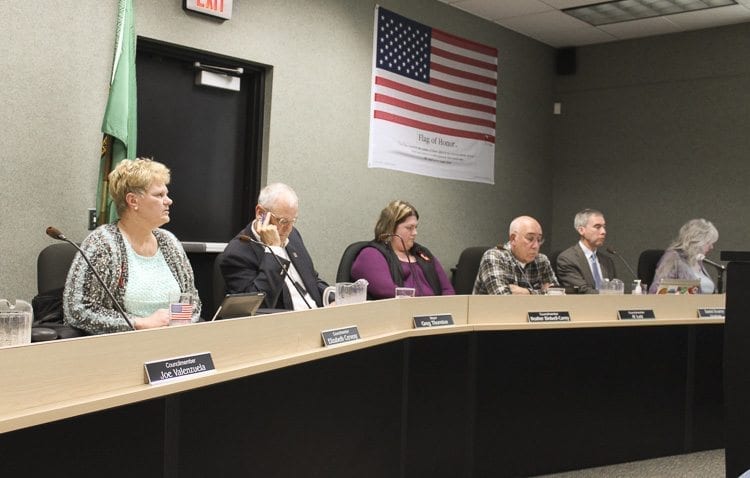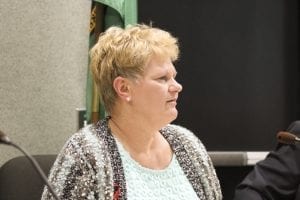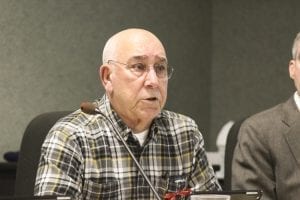La Center city council does not vote on ordinance to assist card rooms
LA CENTER — Members of the La Center City Council failed to pass an ordinance that would have reduced the gambling tax levied on the city’s two card rooms at a council meeting Wednesday.
The proposed ordinance would have reduced the gambling tax paid by the Last Frontier and Palace casinos from 10 percent to 5 percent for the final three months of 2017. It was intended to help the two card rooms stay profitable in the face of increasing challenges, such as the new ilani Casino which opened earlier this year.

Paul Lewis, a financial consultant that works with La Center’s Budget Advisory Committee, said that the proposed tax reduction would only be in effect from October to December of 2017. According to Lewis, the proposal stemmed from the impacts of several factors on the card rooms.
The opening of ilani was a major factor in card room revenue reduction, Lewis noted. However, the impact of Washington’s minimum wage increase has also impacted costs not only by raising the wages of minimum wage employees, but by forcing a change in the entire pay structure among all employees to compensate for the wage increase. Lewis also noted detrimental impacts of the Affordable Care Act on the ability of the card rooms to make revenue.
“Revenues have been declining recently and flat over the long haul,” Lewis said.

Lewis also noted that road construction on La Center Road was adversely affecting customer turnout at the card rooms. The card rooms also faced lower revenues when faced with costs such as rent, utilities and property taxes associated with the two closed card rooms (the New Phoenix and Chips casinos) in La Center, Lewis said.
In his presentation to the council, Lewis said that despite the decreased revenues from the card rooms, amounting to an approximately 20 percent decrease from 2016, the city of La Center still would receive a general fund surplus of $300,000 to $500,000 in 2017. The year to date gambling tax revenues were approximately $1.9 million, Lewis said.
The city’s financial forecast was not as bleak as had been previously expected, Lewis said. The initial 2018 revenue projection had been $1.1 million, but had been revised to $1.6 million as a result of the card rooms actually performing better than had been anticipated.
If the ordinance had been approved, the city would have seen a $225,000 decrease in gambling tax revenues from Oct. 1 to Dec. 31. Lewis noted that the general fund would have a surplus for the year regardless of whether or not the ordinance passed.
Council Member Al Luiz expressed dissatisfaction with the ordinance.
“I can’t in good conscience consider lowering the gambling taxes for numerous reasons,” Luiz said.
He said that the $225,000 tax reduction belongs to La Center citizens, and should not be awarded to the card rooms. To Luiz, passing the ordinance would be a reward for mismanagement.
“To me it just does not make good business sense,” Luiz said, citing gross sales from the card rooms in excess of $800,000 in August.
During public testimony regarding the ordinance, many members of the public expressed a desire to enact the ordinance in hopes that it would help the card rooms.
John Bockmier, a consultant representing both the Last Frontier and Palace card rooms, said that the opening of the ilani Casino, along with increased labor costs associated with minimum wage increases, created an “extremely difficult competitive environment.”
“Our businesses have seen a dramatic decline in revenues,” Bockmier said, “and we are in serious trouble.” He encouraged the council to approve the ordinance as a way to provide immediate assistance to the card rooms as well as allowing the city and card rooms time to work out a new financial strategy for the future.

La Center resident Steve Workman said that “the city and the card rooms are in a partnership. We need to keep both of them alive.” Workman said that if one of the card rooms were to close, La Center would be in financial trouble and therefore recommended that the council approve the ordinance.
Morgan Wentworth, the facilities manager for the Last Frontier casino said that he was concerned about job security and urged that the ordinance pass.
“I’m also concerned with my extended work family losing their jobs,” Wentworth said. He addressed claims that the card rooms were mismanaged, and said that this was not the case. Rather, they were running out of options to cope with increased competition and decreased revenues.
Jeremy Smith, an employee at the Last Frontier casino, said that in the past he has tried to keep a positive outlook when asked about the financial future of the casinos. However, Smith said that recently the card rooms have been in increasingly poor financial condition.
“As an employee of the card rooms,” Smith said, “I would hope that the city would be willing to work with the card rooms.”
Not all of the citizen comments were in unwavering support of the proposed tax reduction.
La Center resident Dennis Hill said that he wanted the casinos to be successful, but was concerned with the companies’ management of the vacant buildings left by the Chips Casino and New Phoenix after they closed. Hill said that he wanted to see the card rooms be proactive in trying to house new businesses in the old casinos to help “make up that deficit.”
“I think they owe us input on what they’re doing to try to get their bottom line up a little higher,” Hill said.
After public testimony closed, council member Elizabeth Cerveny said that the casinos “grew hand in hand with the community,” and that much of the revenues generated for the city had allowed street and park improvements.
“I think we’ve had a very good relationship for the entire time that they’ve been here,” Cerveny said, and urged the council members to remember that relationship in the vote.
Cerveny moved to approve the ordinance reducing the card room tax rate. However, no council member seconded the motion, and the ordinance failed to proceed to a vote. Council member Joe Valenzuela was absent from the meeting.
When reached for comment after the failure of the ordinance, Bockmier said “I’m very disappointed that it didn’t work out but we still have businesses to run and we’re going to do that to the best of our abilities.”
Prior to the public hearing on the card room tax ordinance, the city council had voted to approve an ordinance that deferred implementation of some utility tax fees until Jan. 1, 2018, and reduce the tax rate to zero percent on some utilities from Jan. 1 to Mar. 31, 2018.
The staff report for the card room tax ordinance is available online here. The ordinance itself can be found here.




